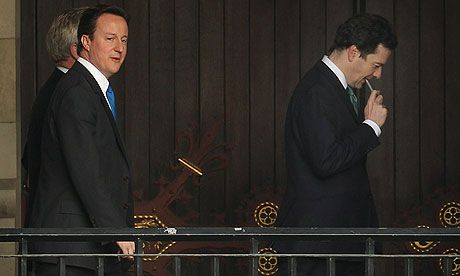THE DAILY TELEGRAPH: Interest rates will start to rise sooner than expected after official figures showed the economy growing at its fastest rate for a decade, economists have said.
Growth over the past six months reached 2 per cent, the fastest pace of expansion over two consecutive quarters since 2000, according to the Office for National Statistics.
The economy received a further significant boost when Standard & Poor's, the ratings agency, revised its outlook on Britain from negative to stable and confirmed the country's AAA credit rating[.] >>> Andrew Porter and Philip Aldrick | Tuesday, October 26, 2010
THE DAILY TELEGRAPH: Greece reignites Europe debt woes: Europe's debt woes have returned to the fore after Greek premier George Papandreou threw open the door to fresh elections and vowed to liberate the nation from "slavery and surveillance". >>> Ambrose Evans-Pritchard | Tuesday, October 26, 2010
We have remarkable recessions and depressions these days. They used to last for years. Now, if we listen to the so-called specialists, they last for a mere few months! It seems like only yesterday that the UK economy was in danger of losing its AAA credit-rating. Now, its superb credit-rating is not in any doubt. Hmm! What is going on here? Surely Osborne's economic remedies cannot have kicked in yet. They have barely been announced. Methinks the people are being manipulated; methinks they are trying to pull the wool over our eyes. Hype it up, why don't you? – © Mark
This comment is also to be found here








